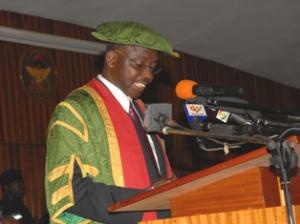Professor William Otoo Ellis, the Vice Chancellor of Kwame Nkrumah University of Science and Technology (KNUST), has called on the HFC Bank to adopt more strategic approaches to address current challenges and also redefine the role of the financial sector to meet the needs of the country.
Speaking at the 25th Anniversary Dinner of the bank held at the Banquet Hall of the state House, he said, the bank had done a lot in the last 25 years.
However, there are still challenges in the country, including several Ghanaians, who remained unemployed, majority in buying and selling, traditional or small scale agriculture and many generally poor, lack of initiative, a depressed industry, lack of capital to engage in productive activity and high interest rates.
Prof. Ellis noted that 25 years in the life of any institution was no mean achievement and commended HFC for standing firm amidst the unstable macro-economic environment that had characterized the Ghanaian economy over the years.
Describing it as a unique, homegrown, traditional institution, he said HFC had played a significant role in the lives of Ghanaians through the creation of employment and more importantly, making it possible for over 5000 Ghanaians to purchase and own their own homes.
“I want to salute the pioneers for the seed they sowed which has and continues to bear great fruit,” he added.
Prof. Ellis maintained that it was important for society to reorient itself from thinking that banks were exploitative and always in for profit since commercial and development banks like the HFC played very important roles in the development agenda of many nations, especially developing countries like Ghana.
Dr. Asare Akuffo, outgoing Managing Director of the bank, said the bank’s story showed that if Ghanaians would plan and act with seriousness and honesty, they will have so many successes to celebrate.
Outlining its achievements over the years, he said its greatest regret was the mostly harsh and unfriendly economic environment within which it had operated, with inflation over 20 per cent, interest rates above 30 per cent, and having to deal with overbearing regulators. “But the important point is that we today have a very strong institution, ready to achieve higher laurels if only it will be allowed to do so.”
He said the bank in its journey had forged partnerships for leverage based on mutual respect and professionalism; some, such as that with the Union Bank of Nigeria, had been successful, having helped the HFC to raise the minimum capital required to obtain its Universal Banking License.
“It took four years and two governors of the central bank before we were granted a banking license. Our entry into banking was difficult as it coincided with the entry of very aggressive banks from the sub-region. We were given a slim chance of survival but we have exceeded expectations and built a sustainable business that is the envy of many,” he stated.
In order to become the first bank in Ghana to offer microfinance services on an enhanced basis, HFC Bank has, since 2005, partnered with a United States Non-Governmental Organization; Global Communities to create the HFC Boafo Microfinance Limited, providing downscale financial services to 18 communities across the country.
He added however that not all its partnerships had worked successfully, as that with the Republic Bank had been ‘chaotic to say the least’.
“Any partnership with too many external parties looking in and interfering, will not work. Despite this temporary challenge we have hope for the future but this future depends on Ghanaian institutions: Social Security and National Insurance Trust, Bank of Ghana, Securities and Exchange Commission, will they fail Ghana?” he asked.
The Bank presented plaques and citations to some of its longest serving staff as well as past Directors who had been instrumental in shaping its success over the 25 year period.
These included Mrs. Stephanie Baeta Ansah, the first MD, Nana Adjei Duku, Dr. Asare Akuffo, Mrs. Evelyn Osei Tutu, Mrs. Mabel Jenkins, Mr. Micheal Atipoley, and Mr. Francis Koranteng.
Regional News of Monday, 27 April 2015
Source: GNA
Adopt strategies to address national challenges – Prof Ellis
Entertainment
















